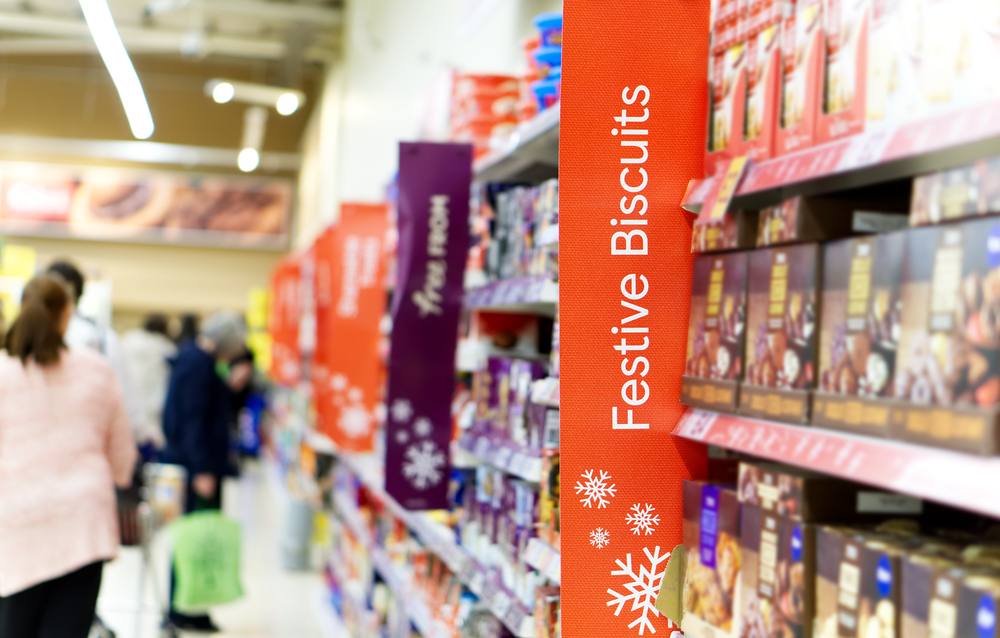Household Bills
Brits spend extra £1bn on festive food this year as inflation soars

Christmas shoppers forked out an extra £1bn on grocery bills this December, but the amount bought was actually down on last year, showing the effect of soaring inflation.
Grocery sales hit £12.8bn in the four weeks to 25 December 2022, which is the first time it has breached the £12bn mark, according to Kantar data.
The consumer research company revealed monthly grocery sales were £1.1bn higher this December compared to the same month last year, with price inflation “the real driving factor” behind this.
While grocery price inflation in December actually dipped 0.2 percentage points to 14.4% – the second time in a row it has fallen – shoppers are paying significantly more for goods compared to last year.
Prices soar as volumes dip
Meanwhile, Kantar noted that the amount people bought this period was actually 1% down year on year, “showing the challenges shoppers are facing”.
As an example, mince pie sales soared 19%, but the volume of purchases barely increased at all.
Christmas pudding sales increased 16% in value, but just 6% in volume.
Elsewhere, Brussels sprouts were off the menu for some households as everyone’s favourite Christmas vegetable saw sales fall from 48% to 45%.
Cold and flu-related items flew off the shelves this year compared to last. Sales of cough lozenges were up 54%, while the market for decongestants grew 36% and facial tissue sales increased 35%.
Football boosts beer sales
And the FIFA men’s World Cup was a boost for the take-home beer market. England’s Quarter Final match against France on 10 December saw sales hit their biggest daily takings of the year, surpassed only by the Friday and Saturday before Christmas as people stocked up on festive drinks, according to Fraser McKevitt, head of retail and consumer insight at Kantar.
He added that while grocery price inflation has fallen for the second month in a row, “raising the hopes that the worst has now passed, it is still a painfully high figure at the current rate, impacting how and what we buy at the shops.”
Supermarket brands prove popular
Indeed, Kantar data revealed that shoppers continue to trade down to supermarket own labels with this area of the market rising 13.3%, well ahead of the 4.7% increase in branded goods.
Supermarket premium own label products also did well at Christmas, and here sales grew 10.2% to reach £700m for the first time.
Friday 23 December was the busiest shopping day of the year, with half of Brits popping to stores or waiting for a delivery. Kantar also revealed this December was stores’ busiest month since the start of the pandemic.
Asda, Morrisons, Sainsbury’s and Tesco accounted for two thirds of all spending, with Asda seeing sales rise 6.4%, Sainsbury’s and Tesco recorded sales up 6.2% and 6% respectively. Morrisons’ sales fell 2.9% but it still had its best performance since June 2021.
Aldi remained the fastest growing grocer with 27% growth taking its market share up from 7.7% this time last year to 9.1%. Lidl’s sales increased 23.9%, moving its market share up by 0.9 percentage points to 7.2%.
Iceland’s sales grew by 10.2%, with sales of frozen poultry rising by 15% and frozen prepared foods by 18%. This pushed Iceland’s market share to 2.5%. Co-op’s market share now stands at 5.6%, while Waitrose has 4.7%. Ocado increased sales by 8.2%, maintaining a market share of 1.7%.